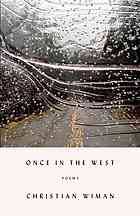
Once in the West
Poems
کتاب های مرتبط
- اطلاعات
- نقد و بررسی
- دیدگاه کاربران
نقد و بررسی

August 18, 2014
The first half or so of this harsh and sometimes masterful fourth outing from poet, memoirist, and editor Wiman (Every Riven Thing) might represent the best verse he has yet penned. Wiman’s short lines and sometimes dense rhymes look back at his West Texas youth, at “that back-// seat, sweat-/ soaked, skin-// habited Heaven,” at the “cactus song” of a high-spirited grandma, at “my hard horizonless country/ whose one road releases me like heat as I walk on.” A former editor of Poetry magazine, Wiman’s wide reading there perhaps helped him develop his serious, careful, and widely admired technique. He now teaches at Yale Divinity School; as the volume progresses the poems’ themes gravitate toward questions of Christian faith. “I tried to cry out in the old way/ of thanksgiving, ritual lamentation, rockshriek of joy./ There was no answer. Had there ever been?” His search for religious answers twines itself tautly with reflections on his own illness, homages to poets of the past, and exemplary self-scrutiny. If these poems of anger and devotion find few immediate admirers, they are nonetheless part of a serious poet’s lifelong thought about life and death, about body and soul, about memory and family, about this world and what is beyond.

Starred review from September 1, 2014
Though the spare, intensely focused lyrics of Wiman's fourth collection (after Stolen Air) often spring from the pain "latent/ in the very grain/ of being," they achieve a spiritual clarity and acceptance all too rare in American poetry. Memories of a West Texas childhood ("my hard horizonless country")--like the life-threatening cancer explored in Wiman's earlier outing (2010's Every Riven Thing)--serve to impel pointed, acutely felt ruminations on the centrality of faith and love in "the random/ kingdom/ of things." In the tradition of George Herbert and Gerard Manley Hopkins, Wiman strives to devise language (paingleaned, milkfeel, stabdazzling) that precisely expresses the inexpressible nature of his complex subjects. Channeled through liquid, gracefully rhymed forms, the poems gleam with unforgettable revelations ("one wants in the end just once to befriend one's own loneliness") and bracing theological insights (the soul is "extrapolated/ from the body's need"). VERDICT Wiman fuses craft and emotion with a diligence, urgency, and exactitude few others can match, creating essential and nourishing poems for these emaciating times.--Fred Muratori, Cornell Univ. Lib., Ithaca, NY
Copyright 2014 Library Journal, LLC Used with permission.

Starred review from September 15, 2014
Wiman (Every Riven Thing, 2010) wrestles with faith and doubt, illness and hope, his words searing and annealing, weighted and slingshot. In his fourth collection, following his religious memoir, My Bright Abyss (2013), he stacks short emphatic lines in spinal-cord configurations forged with molten emotion. So fiery is his writing, Wiman's words meld together in hot coins of vision: painlearned, timestorm, shinedying, lightswirled, starblazing. Wiman writes of his boyhood in the grit of rural Texas, portraying the young and the old with full-hearted perception and sympathy, ferocious love and sharp wit. He remembers a boyhood friend's death, brings us into a rest home, captures the rough eloquence of silent men and the wry inventiveness of country talk. His bouts with cancer yield urgently questioning lines: this burn of unbeing, / this mad metastasis of Now? These galvanizing poems are chopped, jabbed, clapped, and stomped, as percussive as a slapped and shaken tambourine. Anger and longing, mourning and gratitude stoke their potent song, while images crack open to reveal epic spiritual mysteries. The word abrading is a touchstone; the driving force of these life-loving poems is concentrated here: I make my scathing / way. (Reprinted with permission of Booklist, copyright 2014, American Library Association.)

























دیدگاه کاربران